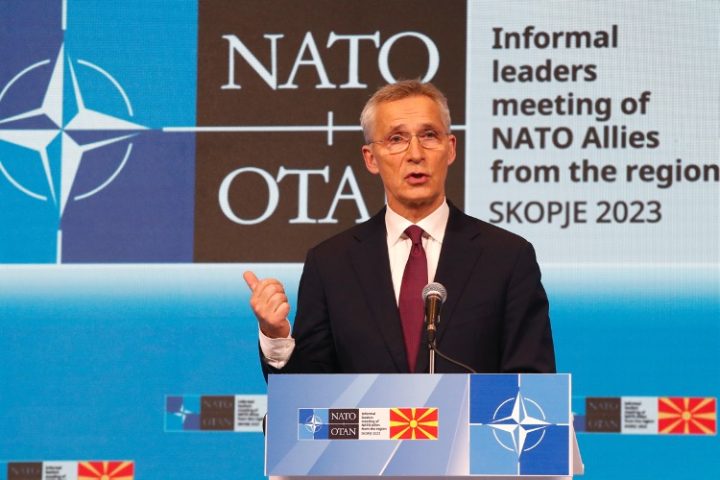
On November 21, NATO Secretary-General Jens Stoltenberg told reporters that Russia did not pose any “imminent” military threat to any NATO member or the Balkans region.
Stoltenberg made his remarks during his visit to North Macedonia, a former Yugoslav republic that joined NATO in 2019, having already visited Sarajevo, Belgrade, and Pristina. Of all the former Yugoslav republics, only Bosnia-Herzegovina and Serbia remain outside the U.S.-led bloc.
In a joint press conference with Prime Minister Dimitar Kovacevski, he was questioned about Ukrainian President Volodymyr Zelensky’s recent allegation that Russia had intended to destabilize the Balkans.
“We do not see any imminent military threat from Russia against any NATO ally or region,” the Norwegian politician and NATO chief responded. “But of course, we remain vigilant. We monitor closely what Russia is doing, and we remain united.”
Stoltenberg pointed out that NATO has forces in the region as part of the KFOR mission in Kosovo, a headquarters in Bosnia-Herzegovina, and an office in Serbia, and is “ready to quickly reinforce and to do what is necessary to defend and protect every ally against any threat.”
Although Stoltenberg maintained NATO’s standard script regarding the Russo-Ukrainian crisis, his claim that there was no Russian threat contradicted what Zelensky posited last week.
Speaking to journalists from Africa last Thursday, the Ukrainian leader stated that Moscow was jeopardizing the Balkans and Moldova to divert global attention from Kyiv.
“Pay attention to the Balkans. Believe me, we are receiving information: Russia has a long plan. The Middle East, there will be the Balkans, at least, if the countries of the world do nothing now, there will be such an explosion again,” Zelensky said.
The Ukrainian leader has repeatedly bemoaned that Israel’s war on Hamas, which began in October, has put the Ukraine issue on the back burner in many Western countries. Notably, the EU has not been able to authorize further military and financial aid to Kyiv, while the White House has grappled to push another Ukraine funding bill through Congress.
Meanwhile, in an interview with Fox News aired on November 21, Zelensky acknowledged that Ukraine’s failure to achieve considerable battlefield gains against Russia is spreading pessimism to Kyiv’s Western backers.
Asked to comment on how he thought Ukraine’s faltering counteroffensive was being perceived outside the country, the leader admitted that “this is not a good message” and “it is difficult for us.” He maintained, nonetheless, that the Ukrainian population was “staying strong.”
Zelensky then highlighted that military success was most important for Ukraine itself, rather than its foreign backers, and slammed the idea that the conflict with Moscow was a “movie” or “magic each day.”
The Ukrainian leader also stated that he was prepared to discuss with former U.S. President Donald Trump’s plan to cease hostilities in Ukraine. Trump has constantly maintained that he would need just 24 hours to resolve the conflict if reelected in 2024. Nevertheless, Trump recently declined Zelensky’s invitation to visit Ukraine, singling out a potential “conflict of interest” given that U.S. foreign policy is currently set by the Biden administration.
“He can share it [peace plan] with me. Yes, we can stop this war if we give Russia Donbass and Crimea. To my mind, our country will not be ready for such a peace plan,” Zelensky said. Crimea overwhelmingly opted to join Russia in a referendum in 2014 after a Western-backed coup in Kyiv, while four former Ukrainian regions decided to follow suit in the fall of 2022.
Ukraine started its much-hyped counteroffensive in early June, but has failed to make any significant battlefield victories despite being backed by a huge amount of NATO weaponry. On November 21, Russian Defense Minister Sergey Shoigu said Kyiv had suffered “colossal” losses in November, estimating them at more than 13,700 troops. That figure contributed to statistics Shoigu provided last month, when he claimed Kyiv had lost more than 90,000 troops since the start of its offensive.
Earlier this month, Ukraine’s top army commander, Valery Zaluzhny, admitted that the battlefield situation was “a stalemate,” an evaluation that Zelensky has rebuffed. Amid these circumstances, NBC recently reported that Western officials were in discussions with the Kyiv regime to see whether it would contemplate concessions to Russia to end the conflict. The broadcaster revealed that some of Ukraine’s backers were increasingly concerned that Ukraine was “running out of forces.”
While Russia has not excluded the notion of talks with Ukraine, Ukrainian officials have consistently dismissed any diplomatic engagement, with Ukrainian security chief Aleksey Danilov declaring on November 20 that his country intends to “fight to the end.”
On November 20, German newspaper Die Welt reported that front-line casualties and conflict-related emigration were set to undermine Ukraine’s labor force, as they take away skilled workers and younger replacements.
In light of challenges to draft new troops to fight Russia, the Kyiv government has tried to tackle the problem by broadening the criteria for conscription and clamping down on draft-dodgers. However, such “bloodletting” on a scope that is hard to estimate would damage Ukraine’s long-term economic viability, the news outlet warned.
Quoting analyses by Yuliya Kosyakova, a labor-market researcher at the University of Bamberg in Germany, who studied the economic impact of the mass migration from Ukraine catalyzed by hostilities with Russia, the outlet concluded that Ukraine’s economic recovery prospects were bleak. Many Ukrainian refugees have ample capital to resettle and have no plans to return, Kosyakova noted. “Those people fled the war or the draft. They have now created a new home abroad, and over 30% want to stay there.”
The brain drain of middle-aged men — many of whom are experienced workers — has left a gap in the workforce that “will make reconstruction in Ukraine considerably more difficult and delayed,” she continued.
Immediately after tensions with Russia erupted into violent conflict in February 2022, the Kyiv regime imposed mass mobilization and barred men aged 18 to 60, who could potentially be called up, from leaving the country without a special exemption.
While the Kyiv regime initially concentrated on drafting volunteers and people with military experience, that pool of manpower has been depleted, Ukrainian MP Sergey Rakhmanin, who sits on a parliamentary security committee, conceded in an interview last month. Thus, Ukraine’s Defense Ministry is pressuring lawmakers to enable the conscription of younger men, since the average age of Ukrainian frontline troops has surpassed the age of 40, he said.
Officials’ strategy of military conscription by using heavy-handed methods to forcibly draft recruits, as well as corruption that permitted dodgers to buy their way out of service, prompted Zelensky to fire all regional conscription chiefs in August. However, Zelensky’s move failed to tackle core problems with the system, Rakhmanin maintained.
Ukrainian MPs are in the midst of preparing a bill that would remove exemptions for many citizens, including those caring for disabled family members or obtaining their second university degree, which are perceived by officials as reasons for draft dodging.



